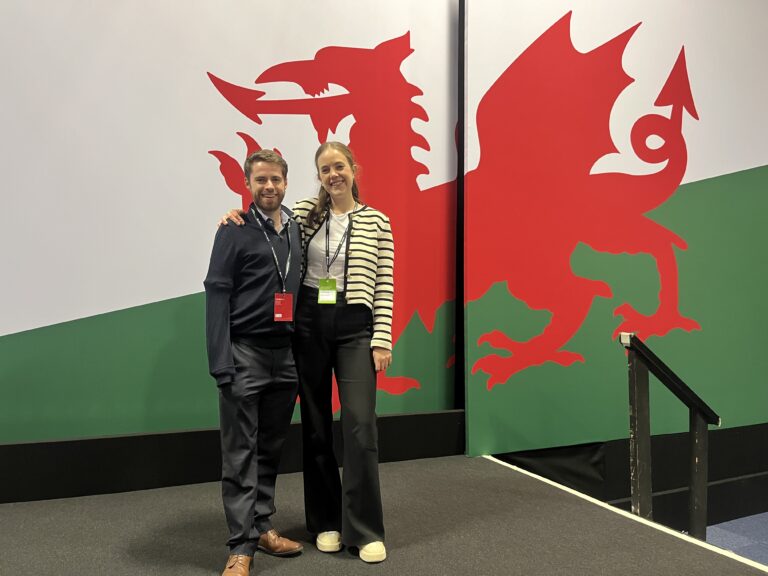The Labour Party descended on ‘the jewel of the Welsh coast’ Llandudno for the first Welsh Labour conference since the general election. Overall there was a buoyant atmosphere – celebrating recent success but recognising the challenges ahead.
Power in partnership
There were many reasons to celebrate. Labour had a strong performance in Wales at the general election, removing all Conservative MPs in Wales. Despite a tumultuous summer with the short reign of Vaughan Gething, new First Minister Eluned Morgan has brought an energy, dynamism and much-needed unity to the Labour group in the Senedd.
Both Eluned Morgan and Prime Minister Keir Starmer emphasised the unique opportunities available with Wales in power in Westminster and Cardiff, pointing to the highest ever funding settlement for Wales in the recent budget which also saw specific funding for Port Talot communities and on coal tip safety.
However the hundreds of farmers outside the venue demonstrated the challenges to come for both UK and Welsh Labour on certain policies. Labour leadership remain fairly relaxed about the backlash, holding the line on the agricultural tax relief changes announced in the budget.
Despite this unity, it’s clear there are still points of divergence with Welsh Labour pursuing a more socially progressive, interventionist brand of Labour politics. One example of this is on digital technology where Eluned Morgan said that the AI revolution should ‘serve our people not replace them.’ A view perhaps more outspoken than UK Labour or DSIT colleagues.
2026 – Reforms and reform
Much of the focus was on the 2026 Senedd elections, where recent reforms will see an introduction of 36 new members meaning the new Senedd will have a total of 96 members. There are also changes to the voting system with a closed party list system for selecting the six members in the 16 new constituencies created by coupling up of the 32 new Westminster constituencies. Introduced by the Labour-led Welsh Government the reforms look set to overturn concerns that the Senedd is not unrepresentative.
The Conference marked the starting-gun for the long campaign with Welsh Labour setting out their successes and challenging, head-on, the alternatives offered by the Conservatives, Plaid Cymru, Reform and Lib Dems. Of these, Labour admit it is Reform they are most concerned about. Like much of England, there were many seats where Reform came second at the general election and there are fears Reform’s offer may be attractive to post-industrial communities across Wales who feel forgotten by politicians in Cardiff and Westminster. There’s a worry that the new closed list system where voters will vote only for a party, with seats then allocated on a proportional basis, could favour Reform.
Reform’s set up in Wales is nascent and uncertain. Despite a major conference in Wales this Autumn, the Party lacks Welsh-specific policy and is understood to have limited plans for a dedicated leadership structure in Wales, instead relying on the ubiquity of Nigel Farage.
Labour have a strong record to run on, highlighting work to deliver free prescriptions, free school meals and free bus passes for the over-60s. The party also announced further £50m for the NHS to tackle the waiting list backlogs, as concerns mount that a failure to tackle low-performing health boards could cost Labour in 2026. It’s a view shared in No 10 for England too, where strategists hold the view that UK Labour will be judged primarily on the NHS at the ballot box in 2029. It has promoted a parallel boost for the NHS in England where the Chancellor has boosted NHS spending despite cuts elsewhere.
Engaging with Welsh Labour
For businesses and organisations there are exciting opportunities to engage with Welsh Labour. The new intake of Labour MPs have a drive to act and show what a Labour government in Westminster can do, particularly for communities that lent their vote to them this time around.
Both for MSs and MPs There’s a particular focus on renewable energy with plenty of projects both approved and in the pipeline. It appears progress in England especially on offshore wind has prompted action in Wales to avoid falling behind.
Wales also has major contributions on UK government priority areas of advanced manufacturing, semi-conductors and the creative industries which policymakers are keen to capitalise on.
Other top issues in the Senedd include tackling health inequality and providing the skills revolution needed for the future. Organisations with solutions will be welcomed into the Senedd.
Now is the time to engage with MSs and policymakers for the 2026 Manifesto as the party develops policy over the next few months – there’s plenty to watch out for.






